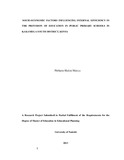| dc.description.abstract | The purpose of the study was to investigate the influence of socio-economic factors on internal efficiency in the provision of education in public primary schools in Kakamega south district. The study was guided by four objectives: To determine the extent to which parental level of education affect completion rate of pupils, To establish the effect of family structure on pupils absenteeism rate, To examine the effect of parental income level on enrolment rate of pupils and to establish the contribution of household duties on pupils’ absenteeism. The study adopted an educational production theory which asserts that an education process is looked at as where inputs are converted into outputs. This was a descriptive survey study that targeted 85 public primary schools, 85 head-teachers, 956 class-teachers and 1,107 standard eight pupils. A sample of 26 head-teachers, 287 class-teachers and 332 standard eight pupils were used. Field survey method was adopted to collect data using questionnaires. Data was analyzed using statistical package for social sciences (SPSS) program and presented using tables, frequencies and percentages. The analysis revealed several socio-economic factors influencing internal efficiency in the provision of primary education in Kakamega south district. These factors are: poverty levels, parental education levels and attitude, family instability, parental income levels and childlabour. The study found out that cases of drop out are very high due to poverty, sickness, early pregnancies, child labour, family instability and low levels of parental education. Absenteeism is also a big challenge being caused by poverty, sickness, parental attitudes, truancy, orphan status and Hiv/Aids. Also, most parents in Kakamega south district are depicted to be poor or very poor as most parents are subsistence farmers, small scale business persons or casual workers. Their education level and background is crucial in a pupils’ progress in education.
From the findings of the study the researcher recommends that the impoverished status of the district should be addressed as a matter of urgency by the community with the assistance of the government for the parents to have reliable sources of income to economically support their children in school. There should be a departure from the reliance on formal or salaried employment which at the moment accounts for less than 30% of the total employment. The researcher also recommends further research to be conducted to determine the status of internal efficiency in private primary schools in Kenya. | en |

